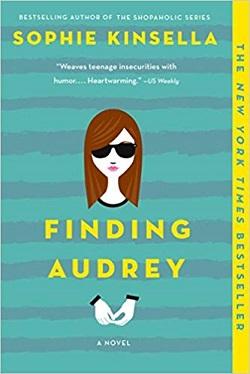Summary

Finding Audrey
by Sophie Kinsella
Audrey can't leave the house. she can't even take off her dark glasses inside the house.
Then her brother's friend Linus stumbles into her life. With his friendly, orange-slice smile and his funny notes, he starts to entice Audrey out again - well, Starbucks is a start. And with Linus at her side, Audrey feels like she can do the things she'd thought were too scary. Suddenly, finding her way back to the real world seems achievable.
.
Read
Finding Audrey on http://kissnovel.net
Martial Peak Reviews
Finding Audrey by Sophie Kinsella is a poignant yet humorous exploration of mental health, family dynamics, and the journey toward self-acceptance. The novel centers around Audrey, a teenage girl grappling with severe anxiety and agoraphobia, which have rendered her unable to leave her house or even remove her dark glasses indoors. Kinsella, known for her witty and engaging writing style, takes a sensitive approach to a topic that is often stigmatized and misunderstood, making this book a compelling read for both young adults and older readers alike.
The story begins with Audrey's struggles, which are depicted through her interactions with her family and her internal monologue. The author does an excellent job of illustrating the chaos of Audrey's mind, allowing readers to empathize with her plight. Kinsella's use of humor in the narrative lightens the heavy themes, making the book accessible without diminishing the seriousness of Audrey's condition. The juxtaposition of Audrey's anxiety with her family's quirky dynamics adds depth to the story, showcasing how mental health issues can affect not just the individual but also those around them.
One of the most significant themes in Finding Audrey is the importance of connection and support. Audrey's journey toward recovery begins when she meets Linus, her brother's friend, who becomes a catalyst for change in her life. Linus is portrayed as a gentle and understanding character, whose presence encourages Audrey to step outside her comfort zone. Their relationship develops organically, highlighting the power of friendship and love in overcoming personal challenges. Kinsella skillfully captures the nuances of their interactions, from the awkwardness of first encounters to the warmth of shared moments, making their bond feel authentic and relatable.
Moreover, the novel delves into the complexities of family relationships. Audrey's parents are depicted as well-meaning but often clueless about how to support their daughter. The portrayal of her mother, in particular, is striking; she embodies the frustration and helplessness that many parents feel when dealing with a child's mental health issues. This dynamic adds another layer to the narrative, emphasizing that recovery is not just an individual journey but also a collective one that involves understanding and communication within the family unit.
Kinsella's writing is characterized by its light-heartedness, which is a hallmark of her style. However, she does not shy away from addressing the darker aspects of mental illness. The balance between humor and seriousness is well-executed, allowing readers to engage with the story without feeling overwhelmed. This approach makes the book not only entertaining but also educational, as it sheds light on the realities of living with anxiety and the importance of seeking help.
Character development is another strong point in Finding Audrey. Audrey evolves significantly throughout the story, moving from a place of isolation to one of gradual empowerment. Her small victories, such as venturing out to Starbucks with Linus, symbolize her progress and resilience. Kinsella effectively illustrates that recovery is not linear; there are setbacks and challenges along the way, which adds realism to Audrey's journey. The supporting characters, including her family and Linus, also experience growth, contributing to the overall theme of healing and understanding.
In comparison to other young adult novels that tackle similar themes, such as All the Bright Places by Jennifer Niven or Girl in Pieces by Kathleen Glasgow, Kinsella's approach is notably lighter and more humorous. While both of those novels address serious mental health issues, they often delve into darker territories. Kinsella, on the other hand, manages to maintain a sense of hope and optimism throughout the narrative, making it a refreshing addition to the genre. This distinction makes Finding Audrey particularly appealing to readers who may be seeking a more uplifting take on mental health.
The impact of Finding Audrey extends beyond its pages. It serves as a conversation starter about mental health, encouraging readers to reflect on their own experiences and the experiences of those around them. Kinsella's portrayal of anxiety is both relatable and enlightening, helping to demystify the condition and reduce stigma. The book's accessible language and engaging storyline make it an excellent choice for young adults who may be navigating their own mental health challenges or supporting friends who are.
In conclusion, Finding Audrey is a beautifully crafted novel that balances humor and heartache while addressing the complexities of mental health. Sophie Kinsella's ability to create relatable characters and weave a narrative that is both entertaining and thought-provoking makes this book a must-read. It not only offers a glimpse into the struggles of anxiety but also highlights the importance of connection, understanding, and resilience. Whether you are a long-time fan of Kinsella or new to her work, this novel is sure to leave a lasting impression.
























Reviews 0
Post a Reviews: